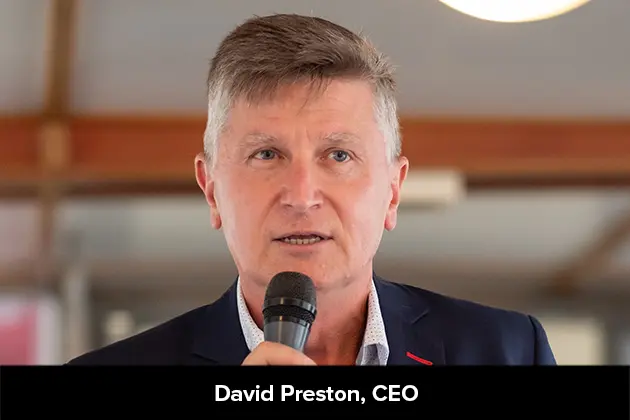In the dynamic landscape of the events industry, innovation and expertise are paramount, and David Preston, CEO embody these qualities as the visionary leader behind Realise, a pioneering organization that has been reshaping the sector since its inception in 2017.
With his vision and a wealth of experience, David set out to revolutionize the industry, starting with event-specific training initiatives that quickly garnered acclaim for his effectiveness and impact. As he navigated the evolving needs of his clients, Realise expanded its offerings to encompass a comprehensive suite of event services, culminating in cutting-edge solutions that harness attendee data for audience intelligence, a testament to David’s unparalleled expertise accumulated over 25+ years in the field.
We’re honoured to have the chance to interview David Preston, CEO of Realise, as he shares his leadership journey and imparts invaluable insights into successful leadership practices based on his entrepreneurial experience.
How was your journey as an entrepreneur to get where you are today?
There were many jobs, including an apprenticeship at 16, that taught me about business and what type of work, and leader, fuelled my imagination. The pivotal time was at IBM. Yes, a huge corporation, but open to new ways of doing things.
That was the start of roles, then my own companies, that let me invent something – a service, a business model, a process. I identify a frustration and that leads to a “what if” action. What can I do and how can I do it?
At IBM we spent millions on events around the world without a smart way of managing them from both a brand and financial perspective. The solution was to build a partnership with George P. Johnson (GPJ). Together, we created the first truly global event marketing agency.
Then, I ran an internal IBM publishing organisation with 100 people who were an anomaly to the bigger business. There was no career path for them. That led to outsourcing the operation and working myself out of job because it was the right answer.
What drove me to start Realise, with my co-founder Richard John, was my role had been made redundant and I had £1,000 in savings. Another example of a point in time when I’ve looked for something that needed a solution and then started something new.
What has been your most outstanding achievement in your career as a leader until now?
Two sides to that. There is business satisfaction and personal satisfaction.
The work I did at IBM, as part of the global event marketing team and with GPJ, was ground-breaking. No one had done it successfully before. It was hard. It was exhilarating. It was, and continues to be today, tremendously satisfying.
From a personal point of view, I’m proud of getting the UK government to approve the event apprenticeship programme (eventsapprenticeship.co.uk).
There is a labour shortage in the event industry. Not everyone is cut out for a university path. Helping define the apprenticeship standard and then delivering the programme has benefited so many young people – as well as those looking to change careers.
Providing that training was the initial focus of Realise. And graduates have gone on to be successful contributors and even manage other apprentices.
How has Realise evolved and made its mark over the previous years? What services does the company provide?
We quadrupled the business during the pandemic. Face-to-face events stopped. Everyone pivoted to online. Again, that moment when we could do something new and do it well.
Realise went from being a £250,000 business in 2020 to £1.5M in 2021 and another £1.5M in 2022 as events transitioned to a hybrid of online and in-person.
We have built a company focused on three areas: event registration services, event-related professional development, and consulting with event organisers, agencies, governments and corporations to “level up” event experiences and those who deliver them.
We operate using the Hollywood Business Model where you bring together the talent you need to create – the director, actors, crew. You deliver and then move on.
I know what we should own and what not. I am a great believer in finding the best people to do the job. It doesn’t mean they have to be on your payroll. That is very much how Realise flexes to meet client needs around the world.
According to you, what are the most important attributes of successful leaders today?
You have to be willing to take a risk. If you are comfortable doing 9 to 5, you will never be a successful entrepreneur. Some might word it as seeing and going after opportunities. All opportunities I have pursued came with risk.
It is interesting, a lot of people talk about being entrepreneurs. Sometimes it is people who are just trying lots of things because they don’t know what they want to do. They are all over the place. But does that make someone an entrepreneur?
To me, it is not relying on other people telling you what your business is about and what you should do. You need to be able to define what your business should do. You try things and learn from them and try again if they don’t work.
A leader requires the freedom to make essential decisions. They work with individuals who share the same vision and have the ability to take independent initiative in order to achieve our main goal.
What do you think has been the biggest hindrance to growth for entrepreneurship today? What are the biggest challenges you have faced?
Many entrepreneurs I have worked with spend extraordinary amounts of time trying to raise money for their idea. The investment community has been cautious. So not having enough personal capital to fully develop the product to the point it can be successful is a big hurdle.
We have grown Realise by paying for it ourselves. Ideas I have invested in have been because there was a clear use for the money – not just pay the entrepreneur’s salary.
What effective strategies have you implemented/initiatives you have taken to achieve success?
For me personally, it is always about clarity. Clarity about why we do what we do. And so, we are not afraid to make tough decisions, try new things. Change is hard. Evolving is easier when you know where you are headed.
Being an innovator yourself, how do you drive innovation?
It is sharing the thrill of exploration and invention. Let’s say we need a space rocket, but we have no idea what it looks like. That is the bit I do. It’s connecting the big picture with the route to define and develop the rocket. Then identify the partnerships, the people you know and trust, to get it from A to Zed.
What future plans do you have? In a few years from now, what would be the best manifestation of yourself from your current position and responsibilities?
When it is time to step back from the day-to-day, I like to think we have built a service business we could hand over. We have developed assets and relationships that could continue. I hear the siren call of the sea and sailing in my future.
What are your advice and tips for burgeoning women entrepreneurs and emerging business leaders?
It comes back to the clarity of what you are trying to do. You have to be fully invested in something, not just trying it as a side gig. One foot on the dock and one foot on the boat is a tricky place to be. At some point you have to commit. And then find people you trust to help realise your vision.
While our event managers make sure the technology is running smoothly, you’ll also find us on the event floor, helping exhibitors, sponsors, speakers, and delegates make the most of their time and investment.










